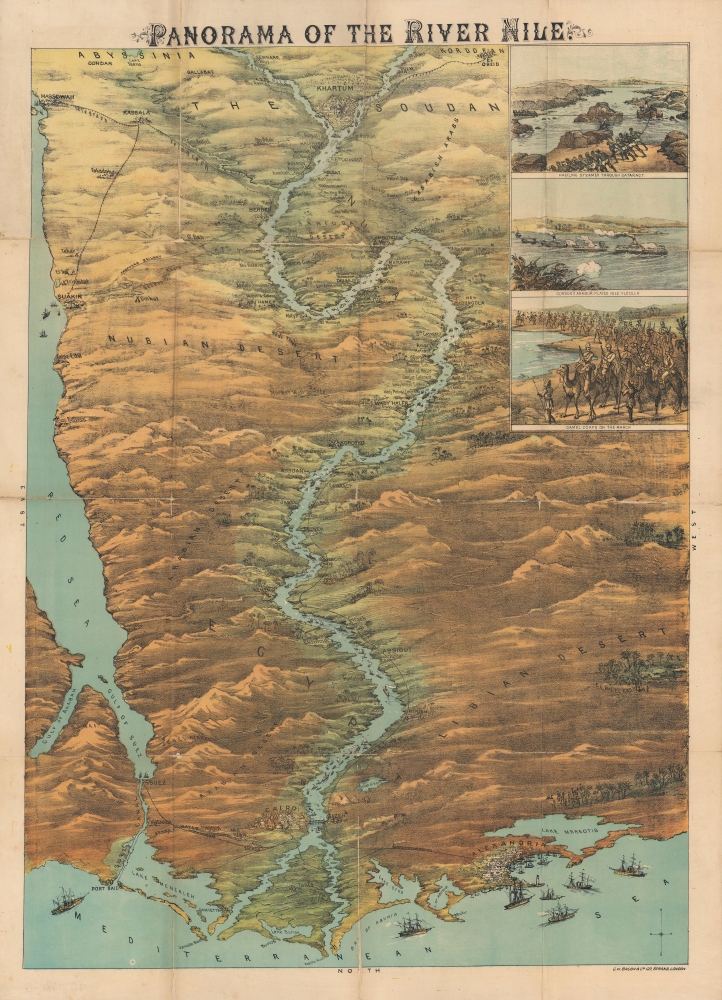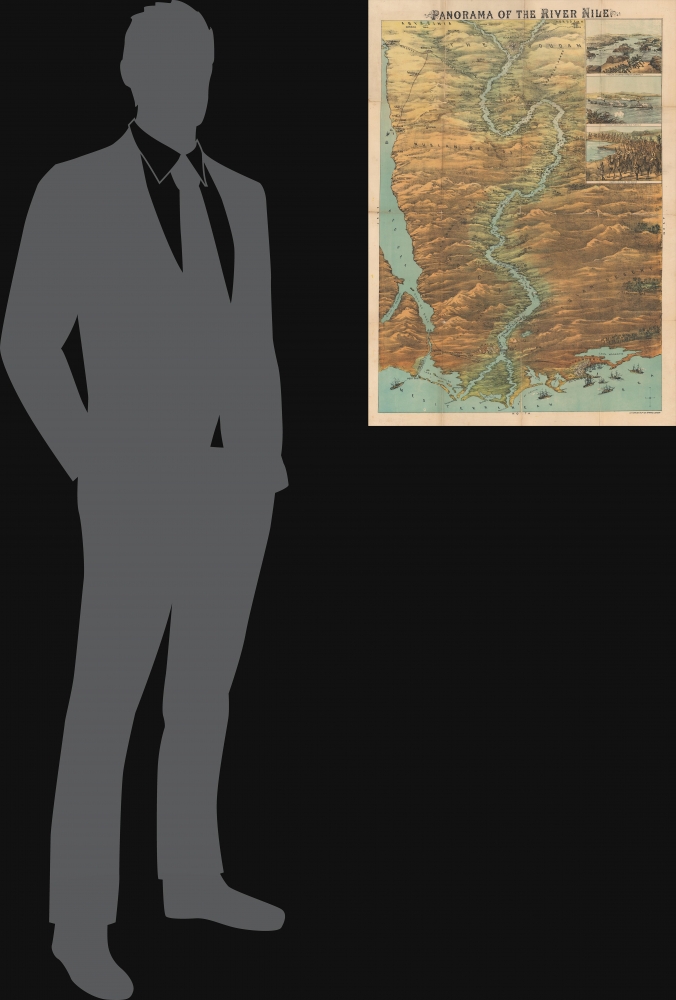This item has been sold, but you can get on the Waitlist to be notified if another example becomes available, or purchase a digital scan.
1884 Bacon Panoramic View of the Nile River, Gordon Relief Expedition
NilePanorama-bacon-1884
Title
1884 (undated) 30.5 x 22 in (77.47 x 55.88 cm)
Description
A Closer Look
This view is oriented towards the south, with Cairo and Alexandria in the foreground and Khartoum in the background. Towns, roads, telegraph lines, and other features are noted, especially in the vicinity of the Nile. The Suez Canal sits at left. Three inset illustrations depict the plodding progress of the relief expedition in its difficult trek up the Nile.Charles Gordon and the Gordon Relief Expedition
Charles George Gordon (1833 - 1885) was one of the more colorful and storied British imperial adventurers of the 19th century. Born to a family with a long line of British military service, he attended a military academy and then served in the Royal Engineers during the Crimean War with great distinction. Already at a young age, Gordon had a reputation for pluckiness and for disregarding orders, which would ultimately be his undoing.Finding peacetime life uninteresting, Gordon volunteered to fight in China during the Second Opium War (1856 - 1860), which he arrived too late to participate in, instead finding work in Shanghai leading a multinational group of mercenaries known as the Ever Victorious Army against the rebels of the Taiping Heavenly Kingdom. He gained a reputation for honesty and effectiveness, imposing strict discipline on his mercenary force that was otherwise prone to plunder, rape, and corruption. Gordon was highly decorated by the Tongzhi Emperor and was praised by the foreign community in China, earning him the nickname 'Chinese Gordon'. At the same time, his frankness, such as criticizing Chinese officials to their face and refusing monetary rewards from the emperor, was seen as uncouth and impudent.
After his service to the emperor in China, Gordon returned to Britain to take up charity work, then was appointed to several government and military commissions in Eastern Europe. He eventually found employment with the Egyptian Khedive government, which appointed him as governor of their southern Equatoria province, over which they had only nominal control. Gordon was appalled by the Ottoman-Egyptian bureaucracy, which he found oppressive and corrupt, and the prevalence of the slave trade (Gordon's abolitionism was inspired by his intense religiosity). Nevertheless, his capabilities as an administrator and diplomat allowed Gordon to rise to the position of Governor-General of the Sudan, earning the new nickname of 'Gordon Pasha.' Nevertheless, Gordon eventually alienated other officials in the bureaucracy (several of whom he fired) to the point that he was not asked to continue in his position and left Egypt in 1880.
He was considered for several positions and briefly worked as a bureaucrat in India before resigning, defying orders from the military to stay in India, and returned to China during a diplomatic crisis with Russia, where he strongly advised the Chinese to avoid a conflict given the state of their military. But the British Foreign Office was still concerned that Gordon might lead a Chinese army in the event of a war, which would cause a diplomatic spat with Russia, and convinced him to return to London. He eventually agreed to take up a position administering the Congo Free State (he was an enthusiast for the project and its architect King Leopold II, not realizing the horrific reality of the situation there), but before he could begin was called on by the British government to report on a large-scale rebellion in Sudan known as the Mahdist Uprising.
Given his prior experience in the region, Gordon was an obvious choice for such a mission, but his public statements about the uprising and his desire to see British military intervention made the government wary of sending him. It ultimately relented to public pressure, giving Gordon a mandate only to gather information and organize an orderly evacuation of Khartoum. Gordon indeed evacuated Khartoum of civilians, but then 'went rogue' and attempted to defend the city, hoping to use it in the future as a base from which to subdue the Mahdist rebels. Relying on friends in the press, Gordon continuously appealed to the British public to pressure the government to send a larger force.
By March 1884, Khartoum was completely cut off and surrounded by Mahdist troops. The Gladstone government was deeply opposed to any effort to relieve Gordon, but by August had to relent to public pressure and authorized a relief force, led by General Garnet Wolseley, who like Gordon was very adept at using the press to rile up the public and pressure the government. Not wanting to send a regular force, the government enlisted French-Canadian voyageurs as private mercenaries, but by the time they arrived in Egypt and were prepared to travel by camel and steamship up the Nile, it was already October. Ascending the cataracts of the Nile was an especially difficult process and, along with skirmishes with Mahdist forces, delayed the expedition's progress by weeks.
The advance of the expedition was closely tracked in the British press. In the meantime, Gordon's force had been reduced by skirmishes and his supplies were running low. The relief force finally reached Khartoum on January 28, 1885, but the Mahdists had finally stormed the city two days earlier, captured it, and killed the entire garrison, including Gordon. The British public was incensed at the death of the popular Gordon, and blamed Wolseley and the other leading officers of the relief expedition for delays, as well as the Gladstone government for its reluctance to send a relief force in the first place. Gordon was lionized as one of the great military heroes of his age, while historians have subsequently debated his legacy, his psychology, and his significance as a public figure of the late Victorian era. The British abandoned the Sudan but returned a decade later, crushed the Mahdists, and established a 'condominium' (effectively a protectorate) over Sudan.
Chromolithography
Chromolithography, sometimes called oleography, is a color lithographic technique developed in the mid-19th century. The process involved using multiple lithographic stones, one for each color, to yield a rich composite effect. Oftentimes, the process would start with a black basecoat upon which subsequent colors were layered. Some chromolithographs used 30 or more separate lithographic stones to achieve the desired product. Chromolithograph color could also be effectively blended for even more dramatic results. The process became extremely popular in the late 19th and early 20th centuries when it emerged as the dominant method of color printing. The vivid color chromolithography produced made it exceptionally effective for advertising and propaganda imageryPublication History and Census
This view was published by G.W. Bacon and Co. in London in late 1884 or early 1885. It is held by four institutions (in some cases cataloged with an earlier date) and has no known history on the market.Cartographer
George Washington Bacon (1830 - 1922) was a London based book and map publisher active in the mid to late 19th century. Bacon's firm G.W. Bacon and Co. purchased the plates created by Edward Weller for the Weekly Dispatch Atlas then modified and updated them for several of their own important atlases, including The New Ordnance Atlas of the British Isles. In 1893, Bacon & Co. acquired the map publishing business of J. Wyld. Then, around the turn of the century, Bacon & Co. itself was folded into the Scottish publishing house of W.& A.K. Johnston. More by this mapmaker...




